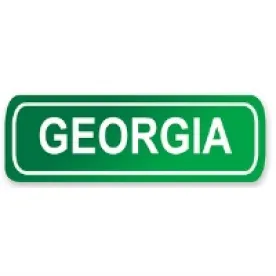Highlights
- Georgia Gov. Kemp issues a revised executive order to update and clarify the state’s COVID-19 response and reopening plans, rules and guidelines
- The existing “Shelter in Place” order remains for certain medical and age benchmarks through June 12, as do social distancing, wearing face coverings and enhanced sanitation recommendations
- This order details the reopening dates and requirements for government employees, bars, restaurants and other business, along with child care and summer camps
On May 12, Georgia Gov. Brian Kemp issued Executive Order 05.12.20.02, which updates and clarifies the state’s status, protocols and posture on its COVID 19 response and reopening. This new order is slated to expire on May 31, 2020.
Residents, Visitors and Group Gatherings
All residents of and visitors to the state of Georgia:
- Must practice social distancing whenever possible, meaning keeping 6 feet or more between persons
- Are strongly encouraged to wear face coverings, as practicable, while outside their homes or place of residence, except when eating, drinking, or exercising outdoors
- Must practice enhanced sanitation in accordance with the guidelines published by the Centers for Disease Control and Prevention (CDC)
No business, establishment, corporation, nonprofit corporation, organization, or county or municipal government shall allow gatherings of 10 or more people unless deemed an “essential business” or “critical infrastructure.” Those businesses operating as “essential” or “critical” must remain compliant with all previously laid out employee screening and sanitation guidelines.
Continuing ‘Shelter in Place’
Pursuant to the previous Executive Order 04.30.20.01, "Sheltering in Place" remains effective until June 12, 2020, at 11:59 P.M. for those Georgians meeting the medical and age benchmarks below:
- Are 65 years of age or older
- Live in a nursing home or long-term care facility, including inpatient hospice, assisted living communities, personal care homes, intermediate care homes, community living arrangements, and community integration homes
- Have chronic lung disease
- Have moderate to severe asthma
- Have severe heart disease
- Who are immunocompromised or who have conditions that can cause a weakened immune system, such as those receiving cancer treatment, who smoke, who have had bone marrow or organ transplantation, who have immune deficiencies, with poorly controlled HIV or AIDS, and with prolonged use of corticosteroids and other immune weakening medication
- Of any age with class III or severe obesity
- Diagnosed with diabetes, liver disease, and with chronic kidney disease undergoing dialysis
Those “Sheltering in Place” may engage in the following activities:
- Conducting or participating in essential services
- Performing necessary travel
- Engaging in gainful employment or the performance of, or travel to and from the performance of, minimum necessary activities to maintain the value of a business, establishment, corporation, nonprofit corporation, or organization not classified as critical infrastructure
- Working in or for critical infrastructure and being actively engaged in the performance of, or travel to and from, their respective employment
Bars, Restaurants, Live Performance Venues and Retail Businesses
Bars and restaurants should remain closed until May 31, 2020. After that date:
- Restaurants will be able to allow up to 10 patrons per 300 square feet. When calculating the total number of public space/square feet, such calculation may include waiting and bar areas, as well as patios or any outdoor dining space, if any, but may not include hallways, restrooms, and spaces closed to patrons.
- Restaurants must adhere to the enhanced sanitation and employee screening guidelines laid out in previous Executive Orders.
Live performance venues and operators of amusement rides, as defined by Code Section 25-15-51, must remain closed to the public until May 31, 2020.
All retail businesses, including food establishments (such as retail and wholesale grocery stores), must implement additional measures to prevent the spread of COVID-19, as practicable. These measures include:
- Limiting the number of patrons inside the store to 50 percent of fire capacity occupancy of the entire store or eight patrons per 1,000 square feet
- Encouraging patrons to use hand sanitizer upon entering
- Encouraging non-cash payments, when possible
- Sanitizing entrance and exit doors at least three times per day
- Encouraging workers to report any safety and health concerns to the employer
- Installing protective screens or other mitigation measures where worker-patron interactions are likely
Gyms, Body Art Studios, Hair Designers, Massage Therapists and Bowling Alleys
All gyms, fitness centers, body art studios, hair designers, massage therapists and bowling alleys must continue to implement employee screening and enhanced sanitation measures to prevent the spread of COVID-19, as practicable.
Outdoor Workers
Georgians who are working outdoors, without regular contact with other persons, such as delivery services, contractors, landscape businesses, and agricultural industry services, are required to practice social distancing and implement sanitation processes in accordance with the guidelines published by the CDC.
Education and Child Care
Nothing in this order may prevent any school, technical school, college or university from requiring faculty and staff to attend meetings or other necessary activities at a school or facility for the purpose of supporting distance learning, research, administration, maintenance, or preparation for the 2020-2021 school year.
Child care facilities may now allow 20 persons to gather in a single location, so long as staff-to-child ratios set forth by the Georgia Department of Early Care and Learning are maintained.
All child care facilities shall cease transporting children for any purpose other than between their place of residence and the child care facility. To the greatest extent possible, all permissible transports shall be conducted in such a way that maintains social distancing.
Summer Camps
Summer camps are permitted to begin operations under state rules and regulations until the CDC guidelines on summer camps are released, at which time the CDC guidelines must be followed.
Until that time, all summer camps must implement additional health screening and sanitation measures to prevent the spread of COVID-19. No summer camps are permitted to host campers overnight until authorized by the Georgia Department of Public Health (DPH).
State Employees and Local Governments
The Department of Administrative Services Human Resource Administration is promulgating guidance for the reopening of state offices and the return of teleworking state employees to in office environments.
County and municipal governments are authorized and empowered to make, amend and rescind such orders, rules and regulations as may be necessary for emergency management purposes and to supplement the carrying out of this order. However such orders, rules and regulations shall not be inconsistent with this order or any other orders, rules or regulations promulgated by the governor or by any state agency exercising a power derived from the Public Health State of Emergency declaration.
The deadline for submission of local government finance reports and indebtedness reports required under Code Section 36-81-8 are extended for any local government that, by virtue of their fiscal year end date, will have such reports due during the Public Health State of Emergency, or within 90 days after the Public Health State of Emergency is terminated or ceases to be renewed by the Governor.





 />i
/>i

